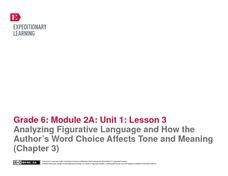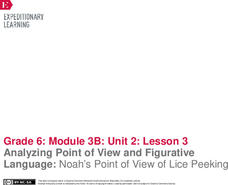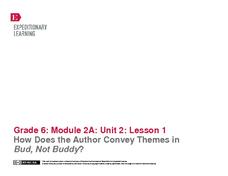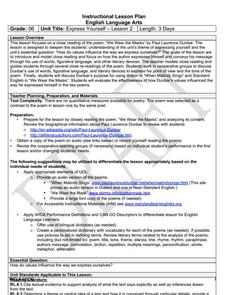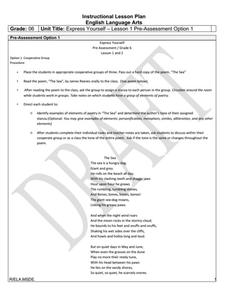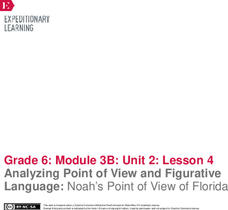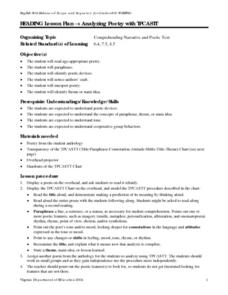E Reading Worksheets
Tone Worksheet 3
The interpretation of a poem often lies in the mind of its reader, especially when reading the tone. Focus on author's word choice, middle schoolers read four different poems and briefly state a perceived tone for each, along with the...
E Reading Worksheets
Tone: Voice of the Speaker
Tone and mood are easy to use interchangeably—and yet they are very different elements of literature. Help middle schoolers discern between the way a speaker feels about his or her subject and the way the audience is meant to feel with a...
EngageNY
Analyzing Figurative Language and How the Author’s Word Choice Affects Tone and Meaning (Chapter 3)
How figurative language affects the tone and meaning in Chapter Three of Christopher Paul Curtis' Bud, Not Buddy is the focus of a series of exercises that ask readers to locate, record, and analyze Curtis' word choices.
E Reading Worksheets
Tone Worksheet 2
The beauty of a poem is lost without an understanding of its tone. Middle schoolers connect author's purpose and word choice to four poems in a literary analysis activity, which prompts them to note each poem's tone and meaning.
E Reading Worksheets
Tone Worksheet 1
Discern the tone in four selected poems with a straightforward assignment. Junior high readers analyze the authors' word choice and text structure to define a tone for each poem, as well as each poem's meaning.
EngageNY
Analyzing Point of View and Figurative Language: Noah’s Point of View of Lice Peeking
Read along with me. Two learners read the parts of Noah and Lice in Flush as the rest of the class follows along. Readers look for unfamiliar words and the use of figurative language in the text. They complete graphic organizers and...
EngageNY
How Does the Author Convey Themes in Bud, Not Buddy?
After reading up to chapter 12 of Bud, Not Buddy by Christopher Paul Curtis, scholars read chapter 13 and take part in a grand conversation about the author's writing techniques. Pupils discuss how his writing conveyed literary themes...
Curated OER
6th Grade: Express Yourself, Lesson 2: Close Read
The second instructional activity of a pair about Paul Laurence Dunbar, this plan focuses in particular on his poem, "We Wear the Masks." After a short historical introduction, class members conduct a series or readings, marking up the...
Curated OER
Express Yourself Pre Assessment Lesson 1 & 2
Find out how much your class knows about literary elements with a quick pre-assessment. Pupils work first individually to identify the instances of personification, metaphor, simile, and more, and then with group members to determine the...
Curated OER
Sleuthing A Writer's Skills
Students read The Train Ride Home by Robin Solomon. In this literature response lesson, students will inspect the writing of Solomon to determine how she established a certain tone through her word choice and paragraph structure....
Curated OER
Mood and Tone
In this literary elements worksheet, students fill in the graphic organizer by writing down the mood and tone of the writing piece. There are three boxes for students to fill in details about the mood, as well as the tone.
Prestwick House
The House on Mango Street Activity Pack
Enrich a unit on The House on Mango Street by Sandra Cisneros with a selection of related activities. The packet contains nine activities that go from pre-reading through wrapping up the novel. Young readers work on studying author's...
Curated OER
Comparing Two Stories
Compare new and old versions of the classic story Alice in Wonderland in this comprehensive worksheet packet. Learners read an excerpt from the original, answering several analysis questions. They do the same for a more modern version,...
EngageNY
Analyzing Point of View and Figurative Language: Noah’s Point of View of Florida
Fishing for words. Scholars search for unfamiliar words in pages 27-29 of Flush, place them in their word catchers, and complete part of Noah’s Point of View graphic organizer. After identifying figurative language, learners analyze tone...
Curated OER
The Rumpelstiltskin Story
Why didn't Rapunzel's hair stop growing? Why did it take the fairy godmother so long to intervene in Cinderella's affairs? Young writers consider unanswered questions like these and compose news articles investigating the true story...
EngageNY
Figurative Language and Word Choice: A Closer Look at Bud, Not Buddy (Chapter 2)
The difference between an average and an unforgettable writing can lie in the author's word choice. The figurative language in Chapter 2 of Christopher Paul Curtis's Newbery Medal Winner, Bud, Not Buddy, is the focus of a series of...
Academy of American Poets
Teach This Poem: "Violin" by Nikki Wallschlaeger
Nikki Wallschlaeger's Violin is the featured poem in a lesson that uses music and multiple readings to delve deep into its analysis. After a writing warm-up, learners watch and listen to a video that showcases Regina Carter Quintet's...
Curated OER
Analyzing Poetry with TPCASTT
Middle schoolers read a poem and complete a TPCASTT chart. They make a prediction about the title (T) , paraphrase each line (P), identify poetic devices and nuances (C-connotation), explore mood and tone (A-attitude), point out shifts...
Novelinks
The Little Prince: Concept/Vocab Analysis
Focus on the literary elements of Antoine de Saint-Exupéry's The Little Prince with a concept analysis sheet. With suggestions and explanations for many of the book's concepts, vocabulary, and other issues that may arise in instruction,...
Curated OER
Laurence Yep's Dragonwings
Students read independently the novel, "Dragonwings," by Laurence Yep and make connections between a text and the world. They summarize, paraphrase, analyze and evaluate skimming and scanning techniques when reading a novel. Each student...
Roy Rosenzweig Center for History and New Media
War and Poetry
A band of brothers or the Devil's agents? Nobel warriors freeing the oppressed or mercenaries working for the military/industrial complex? Groups examine poems from the Civil War, World War I, and World War II to determine the poets'...
Curated OER
Come On, Rain!
Students read and analyze the story. In this language arts instructional activity, students read Come on, Rain! and examine how mood and tone are created, the use of figurative language and the characteristics of the genre. Students...
Academy of American Poets
Teach This Poem: "Election Day, November, 1884" by Walt Whitman
To begin a study of Walt Whitman's poem, "Election Day, November 1884," learners first call out a word or two that describes their reaction to the recent presidential election. They then read an encyclopedia entry about the Presidential...
Curated OER
Bring Read-to-Learn Activities into Your Classroom
Shift your instruction from teacher-centered to student-centered, which requires learners to do the heavy lifting.
Other popular searches
- Author's Tone and Mood
- Authors Tone and Mood
- Teaching Author's Tone
- Reading Authors Tone
- Analyzing Author's Tone
- Authors Tone and Voice
- Author's Tone and Style
- Understand the Author's Tone
- Authors Tone Powerpoint
- Writing Author's Tone




